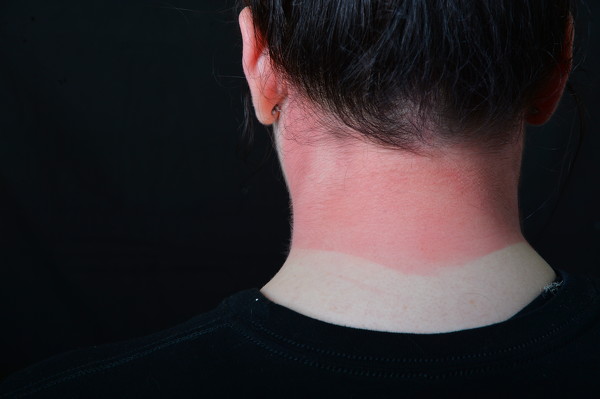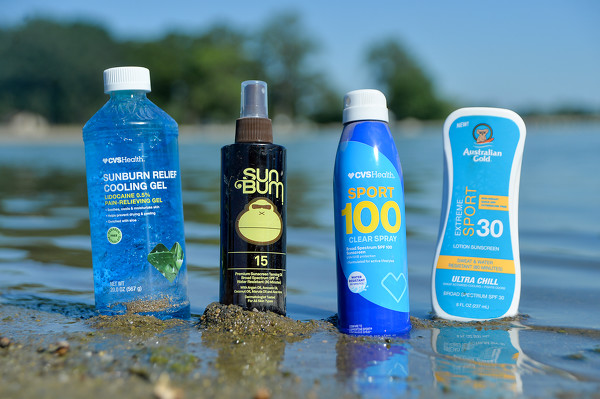Tuesday, July 5th, 2022
SUNBURNS You have skin in this game
Protect yourself from the harmful effects of the sun
By William Kincaid
With boating, swimming and other summer outdoor activities now in full gear, residents are strongly encouraged to apply sunscreen correctly and wear sunglasses and hats to protect against the sun's cancer-causing, ultraviolet rays.

Photo by Paige Sutter/The Daily Standard
A painful sunburn.
Skin cancer on the rise.
"It's extremely prevalent right now and really over the last decades," said Dr. Gary Grosel, chief medical officer of United Healthcare of Ohio.
In fact, skin cancer develops in one in five Americans by age 70, according to Grosel.
"Non-melanoma is like two to three million people a year are getting this type of cancer," Grosel said. "Melanoma, which is more the serious one that people actually die from, about 130,000.
"There are more people that are being diagnosed with skin cancer than all the other cancers combined, so it's definitely on the rise and something that we really need to be a little more aware of."
Blame the sun
Grosel credits a host of factors for rising cases of skin cancer. However, 90% of all skin cancers are due to unprotected sun exposure, he stressed.
"Things like increased outdoor activities that we're doing more of, the ozone being depleted, some of the clothing styles we're using and really even the increased longevity of people in general, all of this is a part of that," Grosel pointed out.
Genetics certainly play a role, too, he said.
"Those that are fair skinned, that have freckles, red or blonde hair, they're more at risk for getting skin cancer," he said.
Tanning beds, though not as widely used as they were in the past, are linked to skin cancer, Grosel said. Contrary to advice of some, it's not beneficial to gain a base tan from a tanning bed before going on vacation, Grosel said.
Nor it it necessary to use a tanning bed to gain sufficient amounts of vitamin D.
"You only need a couple minutes … outdoors and you'll get enough of the vitamin D. You don't need anything further regarding that," he said.
Skin cancer affects everyone
Skin cancers can develop in Americans both young and old, Grosel said.
"Younger people can still get this but over time those who have been in the sun for long periods of time as they get older have more of a chance of developing it," he said. "But anyone can get it."
Valerie Heitkamp, director of the Cancer Association of Mercer County, said the organization has clients with skin cancer.
"The clients we have seen over the past couple of years have all attributed their cancer to being in the sun a lot. They almost all (have) been over the age of 50," she said. "Years ago sunscreen wasn't pushed like it is now."

Photo by Paige Sutter/The Daily Standard
A representative sample of skin protection products include sunscreen, oil and sunburn relief cooling gel.
The right sunscreen
Both UVA and UVB rays can cause cancer, so it's important to choose a sunscreen that safeguards against both. Such sunscreens are widely available, Grosel said.
"So when you do get a sunscreen just make sure you're protected from both," he said. Both can lead to cancer although ultraviolet B is the one that affects the skin and causes more issues and is more prevalent for cancer."
SPF 30 level sunscreens may be enough for people, Grosel said. While SPF 30 protects against 97% of the sun's rays , the higher grade - and often higher priced - SPF 50 protects against 98% of the sun's rays.
"There really isn't that much of a difference," he said.
Grosel said though sunscreen sprays are more convenient than lotions they can irritate the lungs and are often applied incorrectly.
"Most people don't use it correctly. The sprays, you should be spraying for six seconds in one area … and then you have to rub it in," he said.
Re-apply sunscreen often
Grosel urges people to reapply sunscreen often, especially when getting out of the water.
"With the pandemic we all want to be outdoors because we're so used to being suck inside, but just be a little bit smarter with sunscreen and using (it) the correct way," he said. "Reapply if you jump in. Kind of try to reapply every two hours."
Those spending long periods of time in the sun such as boaters should limit the time they expose their skin and consider covering up during peak sunlight times, he said. UVA rays are present all day while UVB rays are strongest between 10 a.m. to 4 p.m.
Sunglasses should be worn outdoors, too, because they protect the eyes and areas of skin where it's difficult to apply sunscreen, Grosel said.
Skin cancer symptoms
Asked about skin cancer signs and symptoms, Grosel said to look for irregular borders of different colors around moles or freckles.
"Even on someone's nose, that all of a sudden they develop something like a freckle there. That should be concerning," he said.
People, especially those predisposed to cancer, should get such abnormalities checked out by a dermatologist or even primary care doctor, Grosel said.
"Melanoma can spread and so the sooner you can treat it the better off you're going to be," he said. "A lot of times they occur on the back or the back of the shoulder or the face that you personally can't see. If you boat with different people with a family and you notice something on someone, let them know."
There are many treatments for melanoma, Grosel said, but emphasized the quicker it's detected, the better the chances are for recovery.
"It all depends on the staging of it, if it has spread already and that is the case with many cancers," he said. "If you can get it early, we can get this treated and you can be fine."
Sun protection tips:
• SPF You don't need the highest SPF possible to protect your skin from the sun's deadly rays. An SPF of 30, if re-applied regularly, is adequate.
• Application Don't be cheap. Rub a generous amount of sunscreen on your skin. Or spray every area for six seconds.
• Re-apply often One application of sunscreen is not enough. Ultraviolet A rays are present all day.
• Cloudy days UV rays are strong enough to cut through even dark clouds, so get in the habit of using sunscreen every day.
• Remember clothes Combine sunscreen with lightweight hats, shirts and pants for extra sun protection.


